- Home
- P. T. Deutermann
Sentinels of Fire Page 2
Sentinels of Fire Read online
Page 2
“In addition to all that, you will be absorbing the art of command. The ship, you, and I will face tactical decisions. I’ll make the actual decisions and give the orders. You will also make decisions, but you will formulate mental orders. The ship will execute my decisions, and you’ll get to see how that comes out, and whether or not your mental decisions might have been better—or worse. I must see to your education for eventual command, because that’s the new Navy. We don’t get command anymore by outliving our contemporaries. Nowadays, we get command because commanding officers who live to tell the tale evaluate us and then make recommendations. Admittedly, sometimes we get command because people die in combat and we’re the only ones available, but the powers that be are determined to get the system a lot more professional than it was before Pearl Harbor.”
I still didn’t know what to say, but it all sounded pretty good to me. Even better, the captain was taking the time to explain all this. I nodded.
“Now this is important,” he continued, as if what he’d been saying earlier had not been important. “I am afraid. Every day that we press closer to Japan, and they react in their ungodly, barbaric fashion, I am even more afraid. I must not show that, because the crew of this ship, most of whom are under the age of twenty-one, are already scared shitless each time one of those kamis comes out of the sky to kill us all. I have to pretend that I’m shrugging it all off, but when I come down here after an air raid and sit on the steel throne, crapping my insides out, all the pretense goes right out of it. I’m telling you this because you’re going to experience it. Malloy isn’t a forty-five-thousand-ton aircraft carrier, surrounded by two dozen or more heavily armed escorts. When and if, but probably when, they get through and hit us, actually hit us, a lot of people around you are going to die. You might die. The ship might die.”
He held up his two hands. The shaking was clearly visible now. “I didn’t use to do this,” he said. “In times past, I was more afraid of screwing up as a brand-new skipper than of anything the Japs could throw at us. Not anymore, XO. I’m sorry if I’m scaring you, but you need to understand this: From here on out, you need to put aside any thought about your career or your professional success as an XO. Where we’re going, those things mean nothing. Your job is to get up each morning pretending that you’re the owner here, of everything that’s going on in this ship, and to act accordingly. Between us, we’ll try to stay alive.”
I stared down at the deck and took a deep breath.
“Well?” he asked.
“What could possibly go wrong?” I asked.
He grinned. “There you go,” he said approvingly. “Welcome aboard. Now, go meet the department heads. I apologize again that you’re not getting a proper turnover, but it really doesn’t matter. Malloy’s a good ship and a happy ship. They’ll call you XO from day one. That’s about all it takes to assume the job. Get each department head to give you a complete tour of his spaces—Malloy is no cruiser or carrier, so it doesn’t take that long. Get your battle gear together and know where it is at all times. These home-island Japs don’t keep gentlemen’s business hours.”
At that moment, the ship’s announcing system broke in to announce that a raid was inbound, many bogeys, and that all hands needed to man their battle stations. Bong, bong, bong, bong.
“Like I was saying,” the captain said, reaching for his helmet. I reached for mine, but it wasn’t there. Lesson number one.
* * *
The next week passed quickly. The ship went to GQ twice daily as a matter of routine, just before sunrise and just before sunset, favorite times for suiciders to make an appearance. I’d moved into the previous XO’s stateroom, a tiny cabin with room for a desk, a bunk, and a chair. The only thing I didn’t have was a roommate, unlike all the rest of the officers except, of course, the captain. My predecessor had been a heavy smoker, so I asked to have the cabin repainted, turning it from sticky amber to white and smelling now of fresh floor wax instead of stale tobacco smoke. I spent a lot of time touring the ship with the department heads as they showed me their assigned spaces and introduced me to their people. I had lunch in the chiefs’ mess, where we mostly talked about morale and the problems of housekeeping endemic to housing, feeding, and cleaning the 320 enlisted and twenty officers embarked, in a ship that was not quite four hundred feet long.
I met Chief Petty Officer Wallace Lamont early on. He was the ship’s chief master at arms, which was a collateral duty. His professional CPO rating was gunner’s mate. When he found out I’d had two tours in gunnery departments, he positively beamed. Strangely enough, he probably spent more time as the CMAA than as a gunner’s mate chief petty officer. Malloy had two gunner’s mate chiefs, and the junior one, Chief Mabry, took care of the day-to-day duties of being Second Division’s CPO. Lamont spent his time adjudicating minor discipline problems, accompanying me on my daily inspections, and generally walking the decks throughout the day and sometimes the night, keeping an experienced thumb on the pulse of the crew.
Chief Lamont turned out to be just the right-hand man the captain had described. Short, feisty, and abrupt, he spoke with a trace of a Scottish burr, an affectation I think he’d developed after making chief eight years ago, to add to his personal mystique. He had come up through the ranks as a gunner’s mate and, of course, still was one. The fact that I had been gunnery officer in two previous ships somewhat offset the fact that Malloy was my first destroyer. Destroyermen were a proud if a somewhat inbred bunch, and I knew there’d been some comment on the fact that I’d only served in much bigger ships, and yet here I was, sent in as XO. Everyone immediately assumed I had pull somewhere.
I didn’t, but there had been some strings pulled to get me into the Naval Academy, courtesy of my parents. Navy people talked of their kids as Navy brats; I’d been a State Department brat. I didn’t find out what my folks had really been doing all those years in a seemingly endless stream of embassies until their retirement party in ’thirty-eight. My father, now deceased after his lungs succumbed to years of heavy smoking, never seemed to get promoted. He was always an assistant attaché of some kind—cultural, financial, agricultural—something vague and not very important. My mother worked as a senior secretary in each of the postings, sometimes as the ambassador’s personal secretary or executive assistant. I was finishing up my senior year at Western High School in Washington on the day they were given their despedida, as it was called, from the U.S. Foreign Service, and I got the day off from school. Instead of going to the State Department headquarters in Foggy Bottom as I expected, we went to the Main Navy Building on B Street, not too far from the White House. There I found out that my parents had been working for the Office of Naval Intelligence the whole time I’d been growing up and, even more surprising, that my dear, sweet mother was the actual intelligence officer, and my father, the guy who never seemed to get promoted, her cover and controller within all those embassies. The director himself awarded each of them a medal for distinguished careers and reminded them that they must never speak about that service, and then we all partook of coffee and cake.
My parents retired to a nice house up in Chevy Chase, Maryland, just outside the District line. I tried once to ask them about what they’d been doing all those years, and all my mother would say was “Typing, Connie, lots and lots of typing.” My father just puffed on his pipe and nodded sagely. That was that, and I didn’t figure out that they were the principal means by which I got my appointment to the Naval Academy in 1931 until well after I’d graduated. I, of course, thought it was because I was so damned handsome, smart, and, well … you know.
The captain had been right—I was addressed as XO right from the start, and there was a subtle but palpable shift in how the enlisted people in this ship interacted with me. As the gunnery officer in the Big Ben I’d been a department head, but not a very important department head, as compared to the air operations officer or the chief engineer. Aircraft carriers had two complements: the ship’s company, which
ran the actual ship, and the carrier air wing, made up of many squadrons and almost a hundred airplanes that did the business of an aircraft carrier: air strikes, reconnaissance missions, close support of troops ashore, and formation defense. My job had been to manage twelve five-inch caliber guns, sixty of the smaller but still lethal four-barreled forty-millimeter Bofors guns, and 76 Oerlikon twenty-millimeter electric machine guns, most of which were arrayed in guntubs stretching up and down both sides of the 860-foot-long flight deck.
If the pilots did their job, my people stood idle, watching the air show as dozens of our fighters pursued and splashed attacking Jap bombers and suiciders all over the formation, while our escorts, ranging from sixty-thousand-ton battleships to twenty-five-hundred-ton destroyers, filled the sky with black spots of ack-ack and, we hoped, flaming Jap planes. When one did get through all that and head directly for us, my guys could put up a pretty good curtain of ack-ack themselves, and, although it was unnerving to watch one of those planes get bigger and bigger, sometimes already on fire or streaming gasoline vapor from punctured wing tanks, the Big Ben was 860 feet long. If they hit us, supposedly we could take it.
Being the exec in a destroyer, however, meant that things were very different. The executive officer of a warship was next in line for command of the ship if something happened to the captain. The exec went around the ship wearing the mantle of command, all the while knowing that if he ran into a situation that baffled him, he could slip topside for a quiet word with the captain. As a department head, I’d been one of many. As the exec, I was one of two, with the other guy being the commanding officer, as close to a god as was still possible in the twentieth century. Luckily for me, Captain Tallmadge was special. The department heads told me of the first time the captain had, right after the change of command, watched a shiphandling evolution go off the tracks, with the officer in charge of the maneuver royally screwing things up. Malloy’s previous skipper would have had a flaming temper tantrum right there on the bridge. Tallmadge had watched things go to hell with obvious but silent dismay. As everyone waited for the explosion, the captain had taken off his hat and thrown it down on the deck in the pilothouse. Then, to everyone’s amazement, he got out of his chair and began to chew out—the hat. Called it names, told it how disappointed he was in it, how it had to do better the next time, that this maneuver wasn’t that hard, and that there’d be no liberty for that hat until things improved. Then he’d gotten back into his captain’s chair, visibly shunning the thoroughly shamed hat, and announced that they were going to try that maneuver again.
It had been theater, and everyone on the bridge recognized that, but it had been most effective. This guy wasn’t going to call you an idiot—he was going to address the problem, not on the basis of whose fault it was but rather by figuring out how to fix it. As they later learned, the new captain’s reaction to any kind of screwup was to tie the incident to insufficient training. Any time he did lose his temper, it was the hat that caught hell. People relaxed and began to pay attention to the training, now that no one was chewing their asses as if they’d done something wrong on purpose. It became standard procedure for the junior officers to reveal that they’d made a hash out of something by saying, “I lit off a Hat Dance this morning, all by myself.” When I heard that story, I recognized there was a certain genius to it and took aboard the underlying message: Blame the problem, not the people. With rare exceptions, the officers, chiefs, and crew were always trying to do their best.
My second week aboard produced my first lesson in command. The carrier formations were operating to the north and west of Okinawa, sending softening-up missions in against the Japs’ aboveground installations on the island. While this was going on, a large air raid appeared midmorning out of densely clouded skies. The CAP fighters—Combat Air Patrol—had been up for an hour, flaming as many of the incoming bombers as they could find, but one of the carriers had been hit and was dealing with a spectacularly big flight-deck fire. We’d shot at some of the raiders, but for some reason our two carriers were not targets that morning. While the raid was still in progress, one of our carrier’s Corsairs came past the ship at low altitude trailing a deadly white cloud of leaking avgas. I’d come out to the bridge from my GQ station in Combat when the lookouts first spotted him.
“He’s gonna bail out or ditch,” the captain said, tracking the wobbly airplane though his binoculars. Combat reported they had no comms with him. Our gunners had recognized the distinctive gull-wing silhouette and held their fire, but everyone was still pretty nervous and scanning the skies for Japs.
The Corsair banked left and then came back toward the ship in a wide circle. He put his flaps down and leveled off ahead of the ship, going away from us as he settled down close to the sea surface.
“Shall I call away the pilot rescue detail?” I asked.
“No,” the captain said. “We’re not stopping with an air raid going on. Any kami who sees a ship with no wake will head right for it. Combat will mark and report his position. The carrier who owns him will send some covering planes. Then one of the destroyers will come, but no one is stopping now, XO. Not right now.”
At that moment the Corsair hit the water, throwing up a large sheet of white spray, dipping its nose and then settling back on an even keel. Seconds later the weight of that enormous engine tipped it forward again and the plane began to sink. We were perhaps five hundred yards away and closing in on him at 25 knots. I was still dealing with what the Captain had said. Were we just going to drive by and do nothing? Then I saw some of mount fifty-one’s gun crew pop out of their mount, wrestling some kind of package over to the port bow.
“Slow to ten knots,” the captain ordered. The lee helmsman reset the engine-order telegraph handles, and the ship immediately began to slow down. Destroyers were handy little ships. The Big Ben would have taken a half hour to slow down that much from 25 knots.
The captain walked out to the port bridge wing as we came past the Corsair, whose tail was now sticking up at a sixty-degree angle. The canopy was open and the pilot was sitting astride the after fuselage, waving at us. The gun crew on the bow heaved an inflatable life raft over the side, smacking it down into the water not ten feet from the sinking plane. The captain waved from the bridge wing, and then we drove right on by. I couldn’t quite make out the pilot’s expression, but I could only imagine what he was thinking. Two minutes later, a Jap Zeke took aim at us from about eight thousand feet, and it took every gun we had to knock him down, and none too soon, either. A second Zeke turned back when we started blasting away at the first one and then apparently saw the pilot bobbing around in his raft two miles behind us. He leveled off and strafed the pilot, reducing the raft to bloody shreds.
When our guns went silent, everyone seemed to be avoiding eye contact with everyone else. The captain had returned to his chair and was staring out the front portholes. I went back into CIC.
Half an hour later, the task force commander declared the air raid over, and we resumed our assigned station and reset our modified GQ condition of readiness. I went back out to the bridge to speak to the skipper, but he had disappeared into his sea cabin. I took a deep breath and knocked on the door. There was no response. Maybe he’d gone down below? I knocked again and opened the door.
The captain was sitting in his chair with his head in his hands. I excused myself and started to back out, but he told me to come in. There was barely room for both of us in the tiny cubicle.
“I was going to tell you that you got tunnel vision out there,” he said. “That’s understandable, especially since you’ve just come from a bird farm. Pilots are everything on a carrier. But if you’re the skipper, the ship’s everything. You must always ask yourself this: Is what I’m about to do or order going to keep my ship safe or put her in unnecessary danger?” He paused to take a deep breath. His red face and shaking hands mirrored my own emotions about leaving that guy out there. “I’m devastated at what happened to that pilot,” he continued
. “Don’t forget, I’ve been that man in the water, all by myself.”
“I understand, sir,” I said. “Besides, you were right. Two kamis did come, and they might have sunk us instead of the pilot. It’s just, I don’t know, a really rotten deal.”
“It is, indeed,” he said patiently. “That’s the difference between being XO and being the CO. You, the exec, get to observe and learn; I, the CO, get to make decisions like that. My head tells me it was the right decision; my heart is sick about it, and not for the first time. I think I’m getting too old for this stuff, XO, so pay attention. You might be in my shoes sooner than you think.”
I had no answer to that, and then he waved me away. He wanted to be alone, and I could well understand that, too. I felt sick.
That night, after we’d secured sundown GQ with no bogeys, I was up in Combat, going over the day’s reports with the navigation officer, Jimmy Enright. The navigation officer was in charge of navigating the ship, and also responsible for all the electronic divisions—the Combat Information Center, Sonar, Radio Central. As the Navy stuffed more and more electronic gear into its ships, the second half of his job was rapidly eclipsing the first part. I made some comment about leaving that pilot in the water.
“He probably understood, XO,” Jimmy said. “He was safer in that life raft than in some tin can that might be blown in two by a kamikaze. Begging your pardon, but your carrier background is showing.”

 The Nugget
The Nugget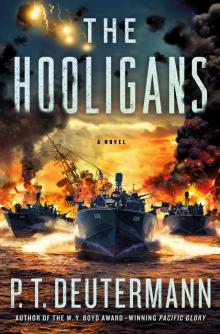 The Hooligans
The Hooligans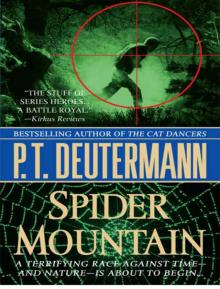 SPIDER MOUNTAIN
SPIDER MOUNTAIN![Cold Frame [retail] Read online](http://i1.bookreadfree.com/i/03/19/cold_frame_retail_preview.jpg) Cold Frame [retail]
Cold Frame [retail] Sweepers
Sweepers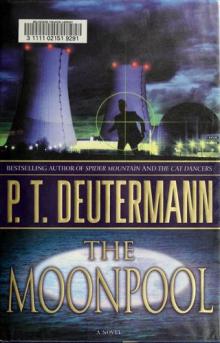 Cam - 03 - The Moonpool
Cam - 03 - The Moonpool Trial by Fire
Trial by Fire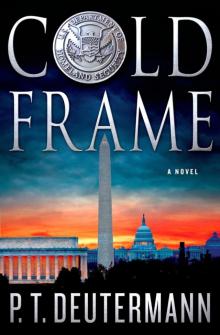 Cold Frame
Cold Frame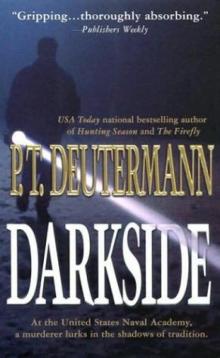 Darkside
Darkside Cam - 04 - Nightwalkers
Cam - 04 - Nightwalkers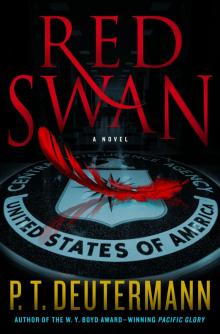 Red Swan
Red Swan The Commodore
The Commodore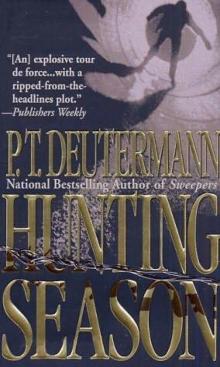 Hunting Season
Hunting Season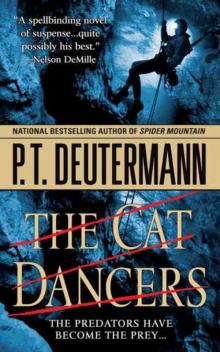 The Cat Dancers
The Cat Dancers Scorpion in the Sea
Scorpion in the Sea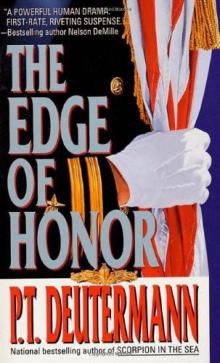 The Edge of Honor
The Edge of Honor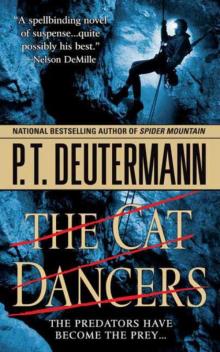 The Cat Dancers cr-1
The Cat Dancers cr-1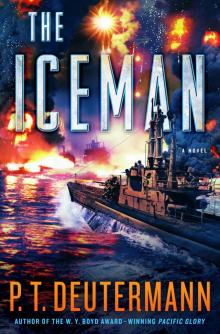 The Iceman
The Iceman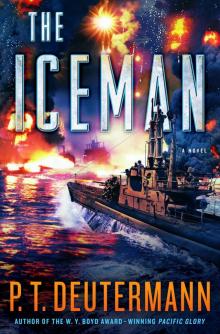 The Iceman_A Novel
The Iceman_A Novel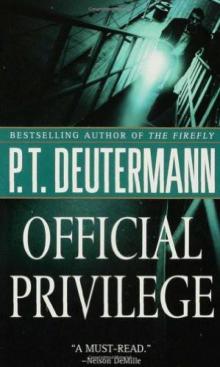 Official Privilege
Official Privilege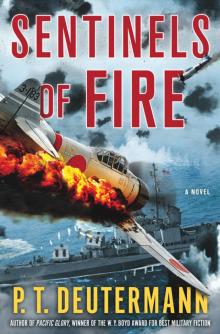 Sentinels of Fire
Sentinels of Fire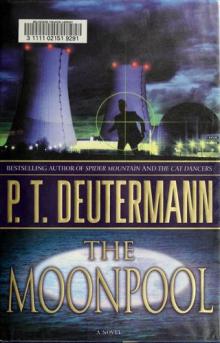 The Moonpool cr-3
The Moonpool cr-3 Nightwalkers cr-4
Nightwalkers cr-4 The Firefly
The Firefly Spider mountain cr-2
Spider mountain cr-2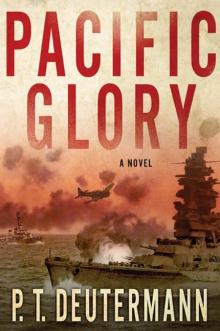 Pacific Glory
Pacific Glory The Last Man
The Last Man